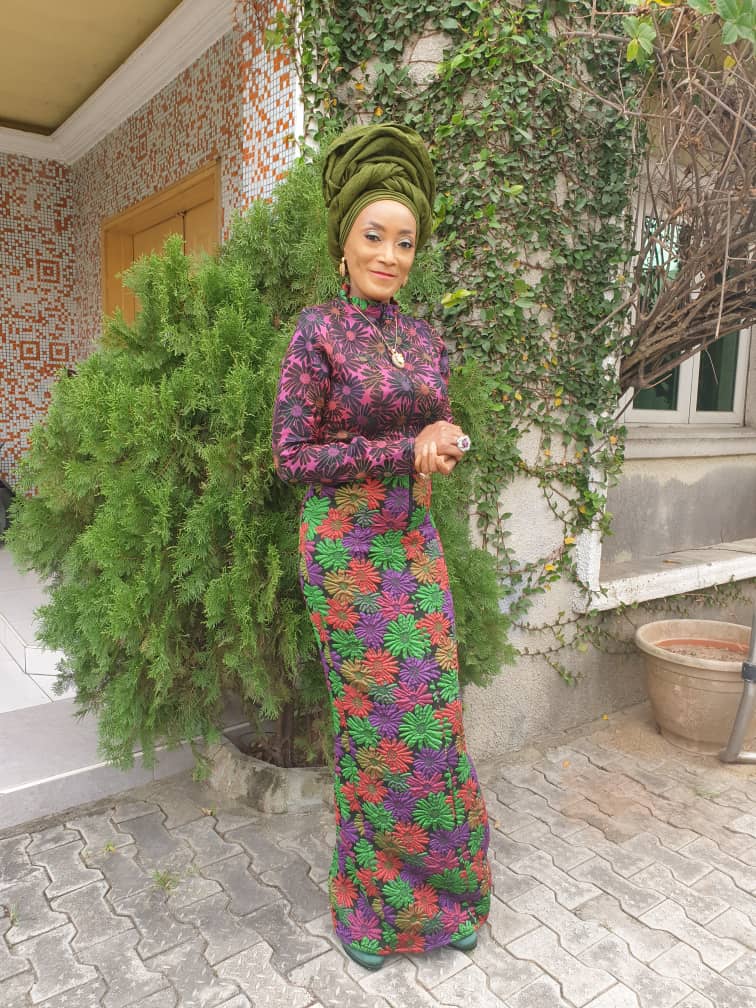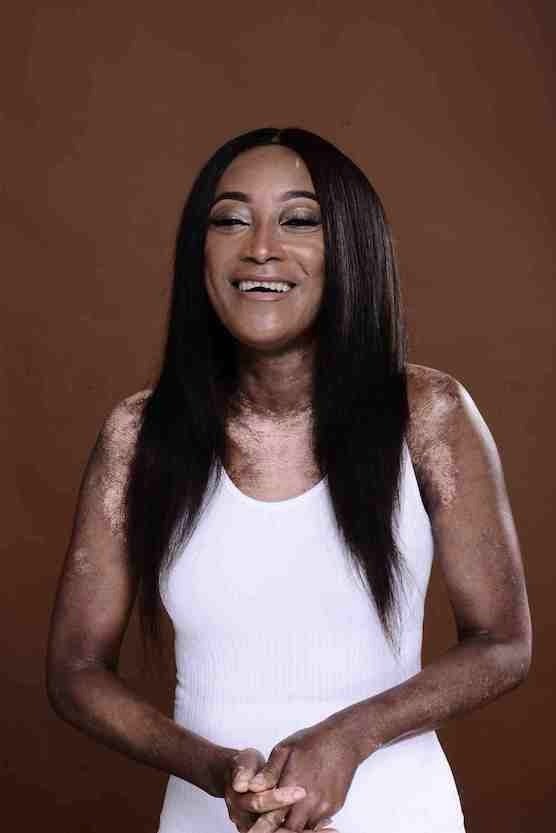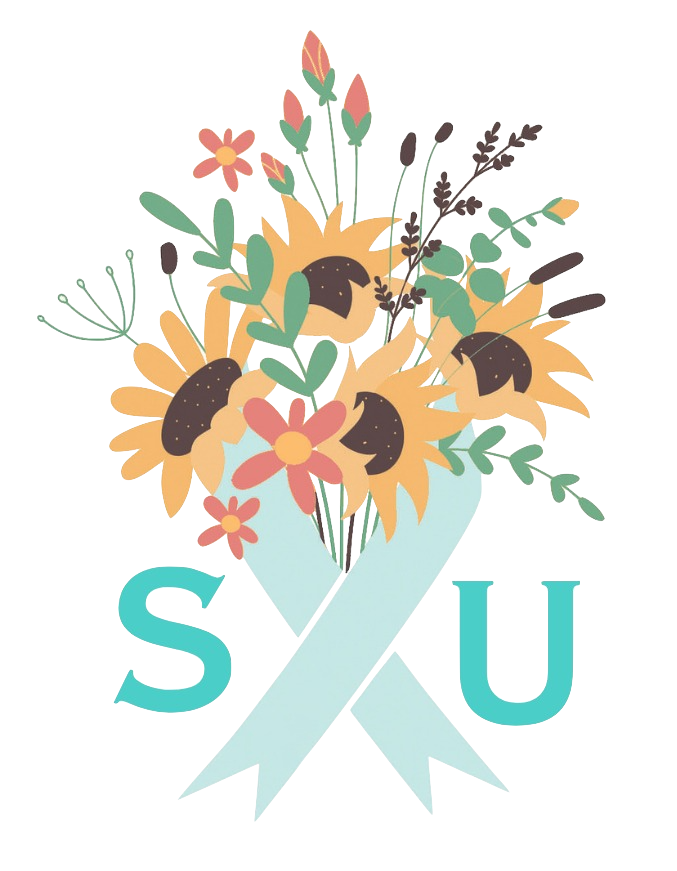Abiola Segun-Williams
Lagos (Nigeria)
ABIOLA SEGUN-WILLIAMS
Scleroderma Stories Issue 6

Please introduce yourself
My name is Abiola Segun-Williams, and I am an actress and writer based in Nigeria. I studied dramatic arts, specializing in playwriting. I have a passion for writing, and I’ve written numerous plays that have been staged. I currently live in Lagos, and I am 55 years old.
When were you first diagnosed with scleroderma?
I received my first diagnosis in 2015, but I had been experiencing symptoms for about three years prior. The symptoms were consistent during that time, but I didn’t know what to make of them. When I received the diagnosis, I remember thinking, “What is scleroderma? What does that even mean?” I had been feeling extremely fatigued, and it was a significant concern for me.
Can you describe the symptoms that led to your diagnosis?
I used to experience extreme tiredness, but I attributed it to my hectic schedule. I was constantly working, often on back-to-back projects, so I thought my fatigue was simply due to my demanding workload. I believed that rest would alleviate it, so I tried taking various vitamins and supplements to boost my energy. I was confused because, prior to this, I had always been in good health and hardly experienced any health issues, not even headaches. This was all very perplexing for me.
I decided to seek medical attention, and I remember undergoing a comprehensive test, but nothing was found. My doctor was puzzled and even questioned if I was a hypochondriac. I assured her that I wasn’t, as it made no sense for me to desire illness with my busy schedule.
After that encounter, I had to return to work on set. While en route, I felt something on my face, specifically on the left side. When I touched it, I noticed swelling. My initial instinct was to turn back and see the doctor again, but considering her previous skepticism, I decided against it. I carried on.
As time went on, my face started to tighten, and my skin became increasingly tight and changed colour. Patches started appearing all over, which was particularly distressing for me. I was genuinely concerned and scared by what was happening.
How did you feel when you were first diagnosed? What were you thinking?
I felt relieved. It was a sense of relief because, by the time of my diagnosis, I was experiencing severe fatigue. I would get tired after just a few steps. Normally, I was light on my feet and walked quickly, but suddenly my steps became heavy. Walking even a short distance left me exhausted and breathless.
When I visited the dermatology department of the Lagos State University Teaching Hospital, the dermatologist took one look at me and immediately said, “This is scleroderma.” No tests were needed to confirm it. She asked about my symptoms, and the only thing she mentioned that I didn’t have was difficulty in swallowing when eating.
Initially, I had no understanding of scleroderma. However, I am a bold and courageous person, and nothing scares me. I took this as a challenge and made up my mind to confront it head-on. My faith as a Christian is an essential aspect of my life and gives me the strength to face any situation. I began to study and research scleroderma. I immersed myself in reading about it and connecting with others who had the condition. As soon as I walked out of the doctor’s office, while I was still in the complex, I immediately googled “scleroderma.” The concept of it was scary, but I didn’t let fear overcome me. I thought to myself, “Okay, now that it has a name, there’s something we can do about it.” From that moment on, I delved into reading everything I could find about the condition.
Even while sitting in the car, I continued to absorb information about scleroderma. I sent the diagnosis to my husband and told him, “This is what the doctor said.” He was just as clueless as I was.
How much time passed between your initial symptoms and your scleroderma diagnosis?
It took about three years. The symptoms developed gradually. Being health-conscious, I knew that autoimmune conditions could be influenced by diet, lifestyle, and emotional factors. So, I was taking various supplements. I was focused on boosting my energy because I was always tired.
During those three years, I always felt the need to go on vacation. Every summer, I made sure to take a vacation with my children when they were younger. During the first three days of our trips, I would just sleep. I told them not to wake me up and that they could take care of themselves. Our go-to destination was usually Dubai from which we would connect to the UK or America.
What symptoms have you developed since your diagnosis?
After my diagnosis, I experienced persistent fatigue as a prominent symptom. I had to consult a rheumatologist and undergo comprehensive tests to confirm scleroderma because it doesn’t always show up in routine tests. They checked my ANA (antinuclear antibodies) levels to confirm the presence of scleroderma. Additionally, my ESR (erythrocyte sedimentation rate) was tested to determine the level of inflammation in my body, which was quite high.
Apart from that, my skin became significantly hardened throughout my body, except for my neck, which remained soft and wrinkly. I did have some sclerosis in my lungs, so I had to undergo infusions. I traveled to India in 2016 for IV treatment. I made a few trips in 2016, 2017 and 2018 for rituximab infusions. Those treatments were immensely helpful and put me on a medication regimen.
However, I decided to stop taking the recommended steroids once I reached five milligrams because of the side effects.
Which symptom was the hardest to deal with?
The most challenging symptom for me was the excruciating pain caused by the impact on my skin. My skin was constantly peeling and highly inflamed, which resulted in unbearable pain. It felt as if my skin was being torn by a sharp blade or knife. It felt like my skin was being stretched thin from the edges and they were putting pepper in the raw wound. That’s how I felt every single day. Yet, I would still push through and go to work because I needed to. I must say that it was by the grace of God that I managed to endure that level of pain. I had multiple doctors, in India and Nigeria, who played crucial roles in my journey.
What were some of the changes in diet and medication?
When it came to medication, I had to resort to strong injections for the pain. It was insane. However, at some point, I realized that sugar was exacerbating the inflammation and pain in my body, so I made the decision to cut out sugar from my diet. Prior to this, I hadn’t been consuming sugar directly, but I was eating carb-heavy foods that rapidly converted to sugar in the body. So I completely stopped eating certain foods, especially rice, for nearly a year.
The pain gradually subsided as I made these dietary changes. Eventually, I reintroduced rice into my meals but in very small portions, limiting myself to just one serving a week. I also avoided and eliminated bread. I indulged in high-carb foods only on special occasions, like Christmas. I steered clear of soft drinks and opted for fruits, although I also avoided the overly sweet ones that had the potential to trigger inflammation in my body.
Let me share how I achieved pain relief in January 2019. I discovered the benefits of ginger and started drinking it as hot tea, which was prepared by my cook, every morning and night. I noticed a gradual reduction in pain, improved mobility on stairs, and decreased fatigue. I continued this ginger regimen alongside a few essential supplements, excluding vitamin C due to its collagen-stimulating effects which are problematic for scleroderma. However, when the COVID-19 pandemic emerged in 2020, I reintroduced my other supplements, including vitamin C, zinc, and vitamin D3. I remained committed to ginger, which has been tremendously beneficial to my well-being.

How did scleroderma affect your ability to interact with friends, family, and work?
Due to the impact on my skin, interacting with others became challenging at times. I vividly remember an incident in either 2016 or 2017 when a friend invited me to an event in Nigeria’s entertainment industry known as Nollywood. I was on my way to the event, planning to do my makeup in the car. Unfortunately, my makeup wouldn’t adhere properly and cover the patches on my face caused by scleroderma. I felt frustrated and upset, nearly on the verge of tears. So, I instructed my driver to turn back and sent a message apologizing for my absence at the event. This affected my confidence in attending public gatherings.
So, I decided – you know what, if I can’t go somewhere without makeup, then I’m not going. I completely stopped wearing makeup because it became too stressful. This was a significant change for me, considering that I am an actress, but I chose to embrace my natural appearance.
I came to terms with my new appearance and the resolve helped in my self appraisal and acceptance. My appearance didn’t stop me from going out and interacting with others. I just stopped wearing makeup to cover the spots on my face. As far as I was concerned, I was more interested in being alive than looking beautiful. Because I had been ill, it adjusted my priorities completely. I’m now more God-focused than I was before. My interest in humans is to influence and impact them for good. I also realized that time on this earth is limited, so we better make use of it while we’re here. Thankfully, I’m now in a much better place. I haven’t been in pain since 2019.
Could you please share more about how you embraced your natural appearance?
My dressing style underwent a significant transformation. Wearing makeup became a tedious task, and I eventually decided to forego it altogether. The only occasions I wear makeup now are significant events like weddings or awards nights, which I attend less frequently due to the stress involved. During the period of intense pain, I would inform people that if they wanted me to attend an event, they needed to provide advance notice. This was not only for physical preparation but also for mental readiness. I discovered that I would often find excuses to stay home.
Opening my suitcase filled with expensive dresses for a close friend’s birthday party was a stark realization. My delicate skin couldn’t bear the weight of those outfits. That became my story for a long time until my body started to heal and the pain subsided. Only then did I regain the energy and stamina to dress up. It’s amusing for people who meet me now and see my old pictures — they can hardly believe the transformation.
You know, I used to be so concerned about my appearance, always striving to look a certain way. But now, I realize that those things don’t matter as much. I’ve embraced my natural hair, which became dreadlocks during my illness when I couldn’t go to the salon. Now, I don’t feel the same pressure and social expectations. My focus is on my commitment to God. I’m passionate about influencing young people and showing them that life is more than looks. Inner beauty and impacting others positively are what truly matters to me now.
What do you consider to be the most challenging aspect of living with scleroderma?
The scariest and most difficult aspect I’ve observed among many people with scleroderma is the impact on their dental health. A lot of individuals experience tooth loss and changes in their mouth structure. Fortunately, I didn’t experience significant dental issues. Instead, my concern was my receding teeth. To address this, I now use a dental appliance while sleeping. As for my face, it has become softer compared to its previously hardened state. I did lose my frontal hair, giving me a unique appearance. However, on the bright side, my hair has grown exceptionally long, almost reaching my hips.
There may be other challenges I’ve encountered, but the most painful period was when I was extremely ill — there was a time when I was almost confined to my bed. My body was incredibly rigid, and I couldn’t stand up straight. I had to rely on my hands for support as a brace. That was an incredibly difficult phase.
What are your hobbies and interests?
I try to immerse myself in reading as much as possible. Previously, I used to watch a lot of TV, but it consumed too much of my time, so I’ve cut back on that. I enjoy sleeping. Additionally, I appreciate good company, although I’m not particularly talkative. I’m more of an introverted extrovert, if that makes sense. I enjoy my own company and cherish moments of solitude. However, I also love being with my children and relish listening to them share their thoughts and stories.

Have you had to make any adjustments in your life due to scleroderma?
I no longer identify myself as someone with scleroderma because I believe I have conquered the disease. However, during the period when I was affected by it, I was able to offer assistance to many others who were facing similar challenges. Unfortunately, some of them have passed away, which is truly heartbreaking. One of the things that helped me cope was getting regular massages. Initially, I would have massages four times a week, but over time, I reduced it to once a week.
I also had to make lifestyle adjustments, such as avoiding exposure to pollution and eliminating unhealthy foods like fried and overly sweet items from my diet. I used to emphasize to others, even those without autoimmune diseases, the importance of maintaining a nutritious diet.
I once met a lady from England who would visit Nigeria during the colder months in England because scleroderma and cold weather do not go well together. That’s one of the aspects I dislike about the disease. In cold temperatures, my limbs, particularly my legs and hands, become stiff and hard. Last year, I spent six weeks in Canada with my daughter, and it was quite chilly. To keep warm, I wore socks indoors, and I regularly drank hot turmeric tea. It’s crucial for individuals dealing with scleroderma to learn how to manage themselves in different climates and situations.
How did scleroderma affect your work abilities?
I used to be a part of a popular television series here in Nigeria, which has been running since 2008. However, I left the show in 2017. Scleroderma had visibly changed my face, making it hard and different in appearance. Additionally, my face was covered in pigmented spots, requiring me to wear heavy makeup. My neck and chest also experienced discoloration and were filled with spots, resembling burnt marks.

How did you navigate your limitations and adjust to them after being diagnosed with scleroderma?
It was a great experience to work on that show and I was retained even after my diagnosis. I stayed on for almost two years with the show, from March 2015 to March 2017 after my diagnosis. It was quite a significant period because it allowed me to manage my treatment expenses and adapt my diet accordingly. But once that opportunity ended, it became much more challenging for me to afford my treatment as before.
However, I believe in the goodness of God, and He presented me with other opportunities. As a writer, producer, and director, I would receive offers to work on projects for big companies, and the income from those projects helped me cover my medical expenses.
I am incredibly blessed with wonderful friends, although they may not be numerous in quantity. The few friends I have are truly amazing. They would come to check on me, send me food, and even help with my hospital bills. One of my friends accompanied me to India for treatment on two occasions, while my pastor generously covered the expenses for my first trip. The support I received was overwhelming, and I am truly grateful.
How did scleroderma impact your relationships?
My friends were not only supportive but also extremely helpful. Some provided financial assistance, while others simply offered their presence during difficult times. I remember moments when I couldn’t speak above a whisper due to the disease, but they would call and chat with me, even though I struggled to respond. They understood my limitations and showed tremendous empathy. One particular friend disliked texting; she preferred talking on the phone. But when I told her I couldn’t speak, she respected my situation.
My relationships remained strong and supportive throughout this journey. My mother moved in with me to provide much needed help, and my daughter, especially when she was home during the holidays, was an incredible support.

What helps you get through difficult times?
During my illness, I had a friend who was there for me. Sadly, she passed away in 2020. She would come to visit me even when she was scared. When she saw me in my frail state, she expressed her fear that I might die. I reassured her that I wasn’t afraid of death. God has always been my source of inspiration and courage throughout this journey. I believe that I’m alive to positively influence others and help them in their lives.
Do you have any goals and dreams for the future now?
Absolutely! I’m currently working on producing my own TV shows and series. I have a strong desire to impact my community, especially young people. I want to collaborate with other production companies to create content that can guide young individuals to live productive and meaningful lives. Additionally, my goal is to see my children fulfill their destinies as ordained by God.
What medications have you taken or introduced?
I was initially prescribed steroids, which I used for a few months. But I decided not to continue with them due to potential side effects. Currently, I take various supplements, including vitamin D3, zinc, NAC (N-acetyl cysteine) and ALA (alpha-lipoic acid) for cell repair, for my lungs, and B12, Bco for energy. I also take turmeric to maintain healthy inflammatory markers. I still drink my ginger tea at night. I eat fresh garlic and onions like three or four times a week. Additionally, I’ve undergone rituximab infusion treatments multiple times.
All of the medications and supplements I mentioned have been helpful to me. They serve different purposes, providing me with energy, supporting my digestion, and improving lung health. Overall, they contribute to my well-being and help me face each day without fatigue or discomfort. Fortunately, I haven’t experienced any side effects from the treatments I’ve undergone. However, I must mention that some treatments, like the rituximab infusion, were quite expensive.
Did you have a lot of scleroderma-related medical expenses?
Yes, the medical expenses were substantial. The cost of treatments, including the rituximab injections, was high. Due to the exchange rate, it was more feasible for me to undergo treatments in India. I received financial help from various sources, including my pastor, family, friends, and my own resources. At one point, I had to spend all the funds I had for one of my treatments. It did put a strain on our finances. However, I was grateful for the assistance I received from my pastor, my husband, and friends. We managed to navigate through those challenges together.
Do you have any financial worries for the future?
Financial worries are something that almost everyone experiences, except for the extremely wealthy. Personally, I have had and still have financial concerns. I always need to buy supplements, which have been essential for my well-being and have been quite costly. Recently, when a friend was traveling, I asked her to help me get some of my supplements, which she did.
I am grateful for her help. Whenever I travel myself, I make sure to stock up on supplements. It can be quite expensive, but I can’t deny their importance in my life.
Are you in online communities?
I used to be part of a scleroderma community on Facebook. However, I found it to be quite depressing, as I would often come across stories of people suffering and even dying. It began to weigh heavily on me, so I reduced my participation and stopped actively engaging. The experiences and beliefs about medications differ greatly, as some people have taken medications with severe side effects that have impacted their overall well-being. For me, it has been more about making lifestyle adjustments. Most importantly, I’ve relied on my faith in God, which has been a tremendous source of support and provision in my life.
What lessons or skills have you learned?
One significant lesson I’ve learned is the importance of spiritual connection. Looking back, I sometimes wonder if I had been more attentive to my spiritual well-being and exercised greater discernment, I could have avoided some aspects of my illness. However, I firmly believe that everything happens for a reason and that God allowed me to go through scleroderma to not only empathize with others facing pain, loss, and disease but also to provide support and strength to them.
While I’m still learning and growing in many areas, one skill I had to acquire was patience. Dealing with chronic illness and being in constant pain taught me to be patient with myself and with others. There were times when I felt frustrated and helpless due to the physical limitations imposed by my condition. However, I gradually learned the value of patience and the importance of practicing it, especially when there is little I can do to change the circumstances.

What advice would you give to people with scleroderma or other chronic illnesses?
My number one advice would be to develop a close relationship with God, as He is the ultimate source of inner strength. When you’re ill, you need a tremendous amount of strength, and it won’t come from external sources. It resides within you. Cultivating a strong connection with God, knowing His word, and confessing His promises can have a profound impact on your life.
Secondly, I would suggest making lifestyle adjustments, regardless of the specific disease. Eliminating or reducing sugar intake, as it is a major contributor to inflammation, is crucial. Rice and bread are also not beneficial for the body, so it’s important to limit their consumption. I understand that dietary options may seem limited, but your health should take priority over temporary satisfaction. Self-control is vital when it comes to making these dietary changes. I also encourage fasting as it can benefit the body in various ways. Practicing moderation in all aspects of life is essential.
Be sure to follow us on Instagram and Facebook (@sclerounited) to see more scleroderma warriors’ journeys in our weekly Sclero Sunday series.
Are you a scleroderma warrior? We’d love to interview you for Scleroderma Stories! Please visit tinyurl.com/share-my-sclero-story or email us at contact@sclerounited.us
Read More
ALSO IN THIS ISSUE…
